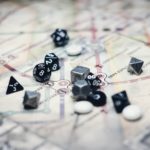 It’s widely believed that numerical board games, such as Monopoly and Othello, help young children develop their maths skills. This was proven by a recent study from the Pontificia Universidad Católica de Chile, in Santiago, Chile, which found that such games enhance the numerical skills of 3-9-year-olds.
It’s widely believed that numerical board games, such as Monopoly and Othello, help young children develop their maths skills. This was proven by a recent study from the Pontificia Universidad Católica de Chile, in Santiago, Chile, which found that such games enhance the numerical skills of 3-9-year-olds.
“Using board games can be considered a strategy with potential effects on basic and complex math skills,” the researchers explain. “Board games can easily be adapted to include learning objectives related to mathematical skills or other domains.”
Helping to learn
The research drew upon a review of 19 studies conducted from 2000 onwards, encompassing children between the ages of 3 and 9. Notably, with the exception of one study, the focus of all these investigations centered on the correlation between board games and the enhancement of mathematical skills.
In each of the studies, children were provided with dedicated board game sessions, typically occurring twice a week and lasting approximately 20 minutes over a period of one-and-a-half months. These sessions were led by adults, including teachers, therapists, and parents.
The children in the studies were divided into different groups. In some cases, children participated in number-based board games, while others engaged in board games that did not specifically target numeracy skills. Furthermore, within the number board game category, children were assigned different types of games, such as Dominoes.
Mathematical performance
The researchers assessed the children’s mathematical performance both before and after the intervention sessions, which aimed to cultivate skills like vocalized counting.
The authors evaluated the success of the interventions across four distinct categories, including basic numerical competency, such as the ability to identify numbers, and fundamental number comprehension, exemplified by understanding that “nine is greater than three.”
The remaining categories covered advanced number comprehension, which entailed accurate addition and subtraction, as well as the development of an interest in mathematics. In certain instances, parents themselves attended training sessions to acquire arithmetic knowledge that they could subsequently employ during the board game sessions.
Clear improvements
The results unequivocally indicated a significant improvement in mathematical skills following the intervention sessions for over half (52%) of the analyzed tasks.
Moreover, in nearly one-third (32%) of the cases, children in the intervention groups exhibited superior outcomes compared to those who did not partake in the board game intervention.
“Future studies should be designed to explore the effects that these games could have on other cognitive and developmental skills,” the authors conclude. “An interesting space for the development of intervention and assessment of board games should open up in the next few years, given the complexity of games and the need to design more and better games for educational purposes.”